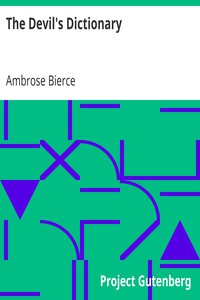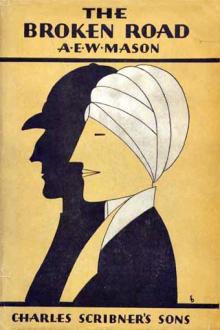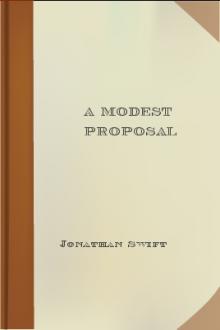The Devil's Dictionary by Ambrose Bierce (good novels to read in english TXT) 📗

- Author: Ambrose Bierce
Book online «The Devil's Dictionary by Ambrose Bierce (good novels to read in english TXT) 📗». Author Ambrose Bierce
PILLORY, n. A mechanical device for inflicting personal distinction —prototype of the modern newspaper conducted by persons of austere virtues and blameless lives.
PIRACY, n. Commerce without its folly-swaddles, just as God made it.
PITIFUL, adj. The state of an enemy or opponent after an imaginary encounter with oneself.
PITY, n. A failing sense of exemption, inspired by contrast.
PLAGIARISM, n. A literary coincidence compounded of a discreditable priority and an honorable subsequence.
PLAGIARIZE, v. To take the thought or style of another writer whom one has never, never read.
PLAGUE, n. In ancient times a general punishment of the innocent for admonition of their ruler, as in the familiar instance of Pharaoh the Immune. The plague as we of to-day have the happiness to know it is merely Nature's fortuitous manifestation of her purposeless objectionableness.
PLAN, v.t. To bother about the best method of accomplishing an accidental result.
PLATITUDE, n. The fundamental element and special glory of popular literature. A thought that snores in words that smoke. The wisdom of a million fools in the diction of a dullard. A fossil sentiment in artificial rock. A moral without the fable. All that is mortal of a departed truth. A demi-tasse of milk-and-mortality. The Pope's-nose of a featherless peacock. A jelly-fish withering on the shore of the sea of thought. The cackle surviving the egg. A desiccated epigram.
PLATONIC, adj. Pertaining to the philosophy of Socrates. Platonic Love is a fool's name for the affection between a disability and a frost.
PLAUDITS, n. Coins with which the populace pays those who tickle and devour it.
PLEASE, v. To lay the foundation for a superstructure of imposition.
PLEASURE, n. The least hateful form of dejection.
PLEBEIAN, n. An ancient Roman who in the blood of his country stained nothing but his hands. Distinguished from the Patrician, who was a saturated solution.
PLEBISCITE, n. A popular vote to ascertain the will of the sovereign.
PLENIPOTENTIARY, adj. Having full power. A Minister Plenipotentiary is a diplomatist possessing absolute authority on condition that he never exert it.
PLEONASM, n. An army of words escorting a corporal of thought.
PLOW, n. An implement that cries aloud for hands accustomed to the pen.
PLUNDER, v. To take the property of another without observing the decent and customary reticences of theft. To effect a change of ownership with the candid concomitance of a brass band. To wrest the wealth of A from B and leave C lamenting a vanished opportunity.
POCKET, n. The cradle of motive and the grave of conscience. In woman this organ is lacking; so she acts without motive, and her conscience, denied burial, remains ever alive, confessing the sins of others.
POETRY, n. A form of expression peculiar to the Land beyond the Magazines.
POKER, n. A game said to be played with cards for some purpose to this lexicographer unknown.
POLICE, n. An armed force for protection and participation.
POLITENESS, n. The most acceptable hypocrisy.
POLITICS, n. A strife of interests masquerading as a contest of principles. The conduct of public affairs for private advantage.
POLITICIAN, n. An eel in the fundamental mud upon which the superstructure of organized society is reared. When he wriggles he mistakes the agitation of his tail for the trembling of the edifice. As compared with the statesman, he suffers the disadvantage of being alive.
POLYGAMY, n. A house of atonement, or expiatory chapel, fitted with several stools of repentance, as distinguished from monogamy, which has but one.
POPULIST, n. A fossil patriot of the early agricultural period, found in the old red soapstone underlying Kansas; characterized by an uncommon spread of ear, which some naturalists contend gave him the power of flight, though Professors Morse and Whitney, pursuing independent lines of thought, have ingeniously pointed out that had he possessed it he would have gone elsewhere. In the picturesque speech of his period, some fragments of which have come down to us, he was known as "The Matter with Kansas."
PORTABLE, adj. Exposed to a mutable ownership through vicissitudes of possession.
His light estate, if neither he did make it Nor yet its former guardian forsake it, Is portable improperty, I take it.Worgum Slupsky
PORTUGUESE, n.pl. A species of geese indigenous to Portugal. They are mostly without feathers and imperfectly edible, even when stuffed with garlic.
POSITIVE, adj. Mistaken at the top of one's voice.
POSITIVISM, n. A philosophy that denies our knowledge of the Real and affirms our ignorance of the Apparent. Its longest exponent is Comte, its broadest Mill and its thickest Spencer.
POSTERITY, n. An appellate court which reverses the judgment of a popular author's contemporaries, the appellant being his obscure competitor.
POTABLE, n. Suitable for drinking. Water is said to be potable; indeed, some declare it our natural beverage, although even they find it palatable only when suffering from the recurrent disorder known as thirst, for which it is a medicine. Upon nothing has so great and diligent ingenuity been brought to bear in all ages and in all countries, except the most uncivilized, as upon the invention of substitutes for water. To hold that this general aversion to that liquid has no basis in the preservative instinct of the race is to be unscientific—and without science we are as the snakes and toads.
POVERTY, n. A file provided for the teeth of the rats of reform. The number of plans for its abolition equals that of the reformers who suffer from it, plus that of the philosophers who know nothing about it. Its victims are distinguished by possession of all the virtues and by their faith in leaders seeking to conduct them into a prosperity where they believe these to be unknown.
PRAY, v. To ask that the laws of the universe be annulled in behalf of a single petitioner confessedly unworthy.
PRE-ADAMITE, n. One of an experimental and apparently unsatisfactory race of antedated Creation and lived under conditions not easily conceived. Melsius believed them to have inhabited "the Void" and to have been something intermediate between fishes and birds. Little its known of them beyond the fact that they supplied Cain with a wife and theologians with a controversy.
PRECEDENT, n. In Law, a previous decision, rule or practice which, in the absence of a definite statute, has whatever force and authority a Judge may choose to give it, thereby greatly simplifying his task of doing as he pleases. As there are precedents for everything, he has only to ignore those that make against his interest and accentuate those in the line of his desire. Invention of the precedent elevates the trial-at-law from the low estate of a fortuitous





Comments (0)